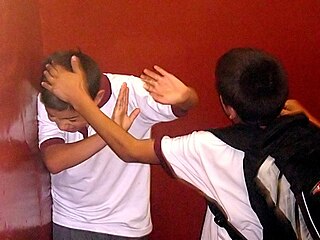
Violence is the use of physical force so as to injure, abuse, damage, or destroy. Other definitions are also used, such as the World Health Organization's definition of violence as "the intentional use of physical force or power, threatened or actual, against oneself, another person, or against a group or community, which either results in or has a high likelihood of resulting in injury, death, psychological harm, maldevelopment, or deprivation."

A mental disorder is an impairment of the mind disrupting normal thinking, feeling, mood, behavior, or social interactions, and accompanied by significant distress or dysfunction. The causes of mental disorders are very complex and vary depending on the particular disorder and the individual. Although the causes of most mental disorders are not fully understood, researchers have identified a variety of biological, psychological, and environmental factors that can contribute to the development or progression of mental disorders. Most mental disorders result in a combination of several different factors rather than just a single factor.

Physical abuse is any intentional act causing injury or trauma to another person or animal by way of bodily contact. In most cases, children are the victims of physical abuse, but adults can also be victims, as in cases of domestic violence or workplace aggression. Alternative terms sometimes used include physical assault or physical violence, and may also include sexual abuse. Physical abuse may involve more than one abuser, and more than one victim.
Child neglect is a form of abuse, an egregious behavior of caregivers that results in a deprivation of child of their basic needs, including the failure to provide adequate supervision, health care, clothing, or housing, as well as other physical, emotional, social, educational, and safety needs. All societies have established that there are necessary behaviors a caregiver must provide in order for a child to develop physically, socially, and emotionally. Causes of neglect may result from several parenting problems including mental disorders, unplanned pregnancy, substance abuse, unemployment, overemployment, domestic violence, and, in special cases, poverty.

Child abuse or child maltreatment is physical, sexual, and/or psychological maltreatment or neglect of a child or children, especially by a parent or a caregiver. Child abuse may include any act or failure to act by a parent or a caregiver that results in actual or potential harm to a child and can occur in a child's home, or in the organizations, schools, or communities the child interacts with.
Complex post-traumatic stress disorder is a psychological disorder that can develop in response to prolonged, repeated experience of interpersonal trauma in a context in which the individual has little or no chance of escape. C-PTSD relates to the trauma model of mental disorders and is associated with chronic sexual, psychological, and physical abuse or neglect, chronic intimate partner violence, victims of prolonged workplace or school bullying, victims of kidnapping and hostage situations, indentured servants, victims of slavery and human trafficking, sweatshop workers, prisoners of war, concentration camp survivors, residential school survivors, prisoners kept in solitary confinement for a long period of time, and defectors from authoritarian religions. It is most often directed at children and emotionally vulnerable adults, and whilst motivations behind such abuse vary, though mostly being predominantly malicious, it has also been shown that the motivations behind such abuse can be well-intentioned. Situations involving captivity/entrapment can lead to C-PTSD-like symptoms, which can include prolonged feelings of terror, worthlessness, helplessness, and deformation of one's identity and sense of self.
Dominic Cappello is a strategist, writer, designer, and educator. He is the creator of the Ten Talks book series published by Hyperion in 2000 and 2001. Ten Talks received national attention when Oprah Winfrey created a show around the book on sex and character in October 2000, featuring parents who had used the books' approaches to family communication.
Childhood trauma is often described as serious adverse childhood experiences (ACEs). Children may go through a range of experiences that classify as psychological trauma, these might include neglect, abandonment, sexual abuse, and physical abuse, witnessing abuse of a sibling or parent, or having a mentally ill parent. These events have profound psychological, physiological, and sociological impacts and can have negative, lasting effects on health and well-being. Kaiser Permanente and the Centers for Disease Control and Prevention's 1998 study on adverse childhood experiences determined that traumatic experiences during childhood are a root cause of many social, emotional, and cognitive impairments that lead to increased risk of unhealthy self-destructive behaviors, risk of violence or re-victimization, chronic health conditions, low life potential and premature mortality. As the number of adverse experiences increases, the risk of problems from childhood through adulthood also rises. Nearly 30 years of study following the initial study has confirmed this. Many states, health providers, and other groups now routinely screen parents and children for ACEs.
Charles L. Whitfield is an American medical doctor in private practice specializing in assisting survivors of childhood trauma with their recovery, and with addictions including alcoholism and related disorders. He is certified by the American Society of Addiction Medicine, a founding member of the National Association for the Children of Alcoholics, and a member of the American Professional Society on the Abuse of Children.

Gabor Maté is a Hungarian-Canadian physician. He has a background in family practice and a special interest in childhood development and trauma, and in their potential lifelong impacts on physical and mental health, including on autoimmune disease, cancer, attention deficit hyperactivity disorder (ADHD), addictions, and a wide range of other conditions.
Child sexual abuse, also called child molestation, is a form of child abuse in which an adult or older adolescent uses a child for sexual stimulation. Forms of child sexual abuse include engaging in sexual activities with a child, indecent exposure, child grooming, and child sexual exploitation, including using a child to produce child pornography.
Trauma bonds are emotional bonds with an individual that arise from a recurring, cyclical pattern of abuse perpetuated by intermittent reinforcement through rewards and punishments. The process of forming trauma bonds is referred to as trauma bonding or traumatic bonding. Traumatic bonding occurs as the result of ongoing cycles of abuse in which the intermittent reinforcement of reward and punishment creates powerful emotional bonds that are resistant to change. A trauma bond usually involves a victim and a perpetrator in a uni-directional relationship wherein the victim forms an emotional bond with the perpetrator. This can also be conceptualized as a dominated-dominator or an abused-abuser dynamic. Two main factors are involved in the establishment of a trauma bond: a power imbalance and intermittent reinforcement of good and bad treatment, or reward and punishment. Trauma bonding can occur in the realms of romantic relationships, parent-child relationships, incestuous relationships, cults, hostage situations, sex trafficking, or tours of duty among military personnel.
The effects of domestic violenceon children play a tremendous role on the well-being and developmental growth of children witnessing the event. Children who witness domestic violence in the home often believe that they are to blame, live in a constant state of fear, and are 15 times more likely to be victims of child abuse. Close observation during an interaction can alert providers to the need for further investigation and intervention, such as dysfunctions in the physical, behavioral, emotional, and social areas of life, and can aid in early intervention and assistance for child victims.
Early childhood is a critical period in a child's life that includes ages from conception to five years old. Psychological stress is an inevitable part of life. Human beings can experience stress from an early age. Although stress is a factor for the average human being, it can be a positive or negative molding aspect in a young child's life.

Nadine Burke Harris is a Canadian-American pediatrician who has been the Surgeon General of California since 2019; she is the first person appointed to that position. She is known for linking adverse childhood experiences and toxic stress with harmful effects to health later in life. Hailed as a pioneer in the treatment of toxic stress, she is an advisory council member for the Clinton Foundation's "Too Small to Fail" campaign, and the founder and former chief executive officer of the Center for Youth Wellness. Her work was also featured in Paul Tough's book How Children Succeed.
Early childhood trauma refers to various types of adversity and traumatic events experienced during the early years of a person's life. This is deemed the most critical developmental period in human life by psychologists. A critical period refers to a sensitive time during the early years of childhood in which children may be more vulnerable to be affected by environmental stimulation. These traumatic events can include serious sickness, natural disasters, family violence, sudden separation from a family member, being the victim of abuse, or suffering the loss of a loved one. Traumatic experiences in early childhood can result in severe consequences throughout adulthood, for instance developing post-traumatic stress disorder, depression, or anxiety. Negative childhood experiences can have a tremendous impact on future violence victimization and perpetration, and lifelong health and opportunity. However, not all children who are exposed to negative stimuli in early childhood will be affected severely in later life; some children come out unscathed after being faced with traumatic events, which is known as resilience. Many factors can account for the invulnerability displayed by certain children in response to adverse social conditions: gender, vulnerability, social support systems, and innate character traits. Much of the research in this area has referred to the Adverse Childhood Experiences Study (ACE) study.
Abuse during childbirth is the mistreatment of women during childbirth in the form(s) of neglect, physical abuse and/or lack of respect. This treatment is regarded as a form of violence against women and a violation of women's rights. It is a recurring issue in facilities around the globe per World Health Organization studies, and can have serious consequences for mother and child. Namely, abuse during childbirth may prevent women from seeking pre-natal care and using other health care services in the future.
Adverse childhood experiences can involve sexual, psychological, or physical abuse. ACEs have been linked to premature death as well as to various health conditions, including those of mental disorders. Resulting toxic stress has also been linked to childhood maltreatment, which is related to a number of neurological changes in the structure of the brain and its function. The Adverse Childhood Experiences Study was the first large scale study to look at the relationship between ten categories of adversity in childhood and health outcomes in adulthood.
Out-of-home placements are an alternative form of care when children must be removed from their homes. Children who are placed out of the home differ in the types and severity of maltreatment experienced compared to children who remain in the home. One-half to two-thirds of youth have experienced a traumatic event leading to increased awareness and growing literature on the impact of trauma on youth. The most common reasons for out-of-home placements are due to physical or sexual abuse, violence, and neglect. Youth who are at risk in their own homes for abuse, neglect, or maltreatment, as well as youth with severe emotional and behavior issues, are placed out of the home with extended family and friends, foster care, or in residential facilities. Out-of-home placements aim to provide children with safety and stability. This temporary, safe environment allows youth to have their physical, mental, moral, and social needs met. However, these youth are in a vulnerable position for experiencing repeated abuse and neglect.
Emily M. Douglas is a public policy scientist conducting research on child and family well-being, the child welfare system, fatal child maltreatment, domestic violence and divorced families, and corporal punishment. She is professor and head of the Department of Social Science and Policy Studies at the Worcester Polytechnic Institute in Worcester, Massachusetts.





